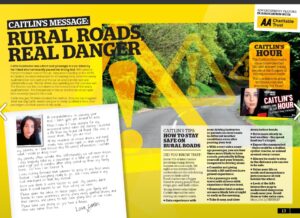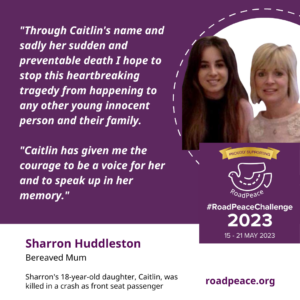Content Warning: This blog contains information that may be distressing to some readers
By Sharron Huddleston
“Do I look OK Mam?”
Little did I know that these would be the very last words that my precious youngest child Caitlin would say to me on the evening of Friday the 14th July 2017.
I am now so grateful that she turned to me that evening, to have those last few seconds for us to speak to each other, before she walked out the door, to get into her friend’s car. She had also asked me to fasten the buttons on the back of her blouse she was wearing, so I also touched her neck for the last time, moments before her leaving our house.
Caitlin was just 18-years-old when she accepted a lift to a restaurant that evening from her 18-year-old friend, who had recently passed her driving test. Heartbreakingly, just moments after leaving our family home, after asking me for reassurance that she looked OK, our beautiful, quietly-spoken, kind, sensitive and loving daughter was killed in a fatal road traffic collision, on the A595 in Bootle in Cumbria. A rural road.
Our precious daughter had taken the full impact of the collision into the passenger door, as the driver had lost control of the car on a bend in the wet road, while travelling at approximately 50mph. Caitlin’s injuries to her tiny body were fatal. Her neck that I had just touched moments before was broken.
The car had spun onto the opposite carriageway as the driver tried to regain control, and the car was side impacted/t-boned by a van full of work tools driven by a man travelling home from work, in the opposite direction. Caitlin died on impact, I have been told, and was trapped in the crushed side of the car for hours before being extracted from the wreckage. Her friend driving was also killed, and the back seat passenger and the van driver were both seriously injured. This was the first time Caitlin had been a passenger in this friend’s car and Caitlin herself couldn’t drive.
In this one crash alone, four families’ lives were affected, with two families bereaved and two people seriously injured.
Since Caitlin’s death I have discovered that the leading cause of death in the age group of 17-24-year-olds is road traffic collisions. A fact I didn’t know beforehand. I now know that many families every year are having to bury their adolescent children through an outdated driving licence system that we have in the UK. Their families’ lives changed forever.
At the Inquest in 2018, the Coroner said the crash was due to the newly qualified driver’s inexperience.
We had to bury our child through someone else’s inexperience of driving!? I struggle to accept this reason why I have had to bury my daughter and that Caitlin has had her whole life and future taken from her through no fault of her own. If Caitlin had died of a terminal illness and any medical intervention had failed to save her, then that is something out of my control, but someone else’s inexperience of driving? This is a man-made problem.
I now know, through my daughter’s death as a passenger in a young novice driver’s car, that young drivers are disproportionately likely to be involved in a crash, and that almost a quarter (24%) of people killed or seriously injured on Britain’s roads are in a collision with a young driver (aged 17-24 years old) even though this age group makes up only about 7% of the total driving population. I also now know that the highest number of collisions involving young drivers happen on rural roads.
This is a neglected problem, causing so much physical and emotional pain to everyone involved.
Of the 313 people killed in crashes involving young car drivers in 2017 (the year Caitlin was killed), 108 were young drivers, 55 were their young passengers (Caitlin being one of this total) and 150 were other road users.
In any other walk of life, if this much harm was happening to our younger generation on a daily basis there would be a public outcry, yet young deaths through road crashes seem to be accepted by society and media. Why? This is deeply upsetting to anyone who has lost a loved one in a horrific road traffic collision.
The deep shock and disbelief that this horrific death had happened to our daughter Caitlin turned me into a shadow of myself. I couldn’t eat for months and I didn’t want to live without her. I just wanted to sleep and never wake up to the horror and reality that Caitlin wasn’t here and would never come home. How could this have happened to her? But I have two other children who needed their Mam, as they too were struggling with the tragedy of losing their younger sister. My two young grandsons wondered where Auntie Caitlin was and my husband was devastated and grieving too for our treasured youngest daughter.
A few months after this tragedy happened to our family, I was made aware of a law that has been in place in other countries for many years, and has proven to reduce young driver and young passenger deaths in car crashes, for years previously to Caitlin being killed. This law is called a Graduated Driving Licence (GDL) and international evidence shows that GDL, in one form or another, can reduce collisions and trauma from collisions involving young drivers, by 20-40%.
GDL systems are a phased approach to driving which builds experience to minimise risk to young and novice drivers.
One element of this law which struck me, was that newly qualified (novice) teenage drivers could not, by law, carry their peer age friends as passengers for a limited time after passing their driving test, until they had gained more experience in driving solo or with an older experienced driver first.
I couldn’t believe that a law like this existed, and I had never heard about it?
I discovered through my research on young novice drivers, that with every extra same-age passenger, they are four to five times more likely to have a crash, potentially killing themselves and their friends, compared to driving alone.
Every state in the USA and Australia has GDL, along with Canada and New Zealand. The introduction of a GDL regime in New Zealand led to a 23% reduction in car crash injuries for 15 to 19-year-olds. All Australian states operate a form of GDL, and fatalities among the 15-24 age group reduced by 29%. Nearly all Canadian provinces have introduced a form of GDL, and each has witnessed a corresponding reduction in collisions involving young drivers.
It was and still is, heart-breaking for our family to know Caitlin’s death was preventable, if only the UK had implemented this life-saving law many years ago. With my research into GDL, I discovered that all through Caitlin’s life and many years before she was even born (1998), many people had campaigned for this law to be introduced in the UK. MPs, road safety charities, insurance companies, police officers, and sadly many bereaved parents who have tragically also lost young teenage children in RTCs, as teenage passengers and young drivers. A police officer, PC Ted Thwaites, from our own county of Cumbria, the county in which Caitlin grew up and was tragically killed in, had campaigned for the introduction of this law, a decade before Caitlin was killed.
I also found through my research that in just 2013 (four years before Caitlin’s death), Justin Tomlinson MP campaigned for the introduction of GDL, and had got as far as a Graduated Licence Scheme Bill. Unfortunately, there was not enough time to debate the Bill. The anticipated Green Paper for the possibility of a GDL scheme didn’t go ahead.
In October 2022, the RAC Foundation and Rees Jeffrey’s Road Fund jointly commissioned TRL to produce a report, ‘Supporting New Drivers in Great Britain.’ It states:
The debate about Graduated Driving Licensing has stalled in Great Britain over two decades of inquiries and evidence gathering. This is likely partly due to the perception that GDL is a ‘one size fits all’ approach, whereas in reality it is a pick-and-mix suite of measures (for example minimum learning periods, and rules on how many passengers can be carried), that can be tailored to different situations and contexts, and which can support new drivers in their early driving, easing them through the riskiest aspects of being behind the wheel while they develop their skills.
This report has confirmed that GDL does not lead to reduced access to employment and education for young people, or problems with enforcement, and these worries are broadly unfounded.
We as a family cannot change the inaction of past Governments, but we can not let another 20 years pass without some form of progress to protect our future younger generation. So I set up ‘Caitlin’s Campaign’ in November 2018, on what should have been Caitlin’s 20th birthday, calling on the Government to put safety precautions/GDL in place nationwide.
The Coroner at Caitlin’s Inquest agreed with me that Graduated Driving Licensing would help prevent future young deaths in the same circumstances that Caitlin had been killed, and he wrote a Preventing Future Deaths Report to the Department for Transport. I am so grateful for the help and support from the Coroner to try to help stop another young person being killed in the same circumstances as Caitlin.
I want to let all parents of teenagers and young drivers themselves to know the risks posed to them upon passing their driving test. Everything that I was unaware of before Caitlin’s preventable death, I need to raise awareness of. I am so thankful to Edmund King OBE, the president of the AA Charitable Trust, who helped me to produce the ‘Caitlin’s Message’ information pages, and these have been published in ‘Learning to Drive’ – ‘The Parents’ Guide’ booklet published by FirstCar. I want ‘Caitlin’s Message’ to be spread far and wide, to raise as much awareness as possible to young people.
This is now my focus to carry on. I need to be a voice now for Caitlin. I know she would want me to do this and Caitlin gives me the courage to speak up. It’s sadly too late for my daughter, but through her name, and sadly her sudden and tragic death, I hope to stop this heart-breaking tragedy from happening to any other innocent person and their family.
Let it not be too late for our younger generation, to help them stay safe on our roads, with simple safety precautions put in place after passing their driving test.
There’s a duty of the decision-makers in Government to protect our inexperienced young drivers and their young teenage passengers. Our children should not be classed as statistics in road crashes, they are the most precious gifts we have been given as parents.
Sharron will be leading the ‘Graduated Driving Licences’ Day of the RoadPeace Challenge 2023 – on Friday May 19. To mark the campaign Sharron will be walking 19 miles across Cumbria, starting at Pooley Bridge on Ullswater and finishing at Windermere, to raise money for RoadPeace, the national charity for road crash victims. She will be joined by members of the Cumbria Constabulary, including her family liaison officer, and Cumbria firefighters. To support Sharron, please make a donation to her fundraising account.
In Loving memory of Caitlin Lydia Huddleston. Aged 18.
#CaitlinsCampaign #CaitlinsMessage #CaitlinsHour

Updated on: 25 April 2023





